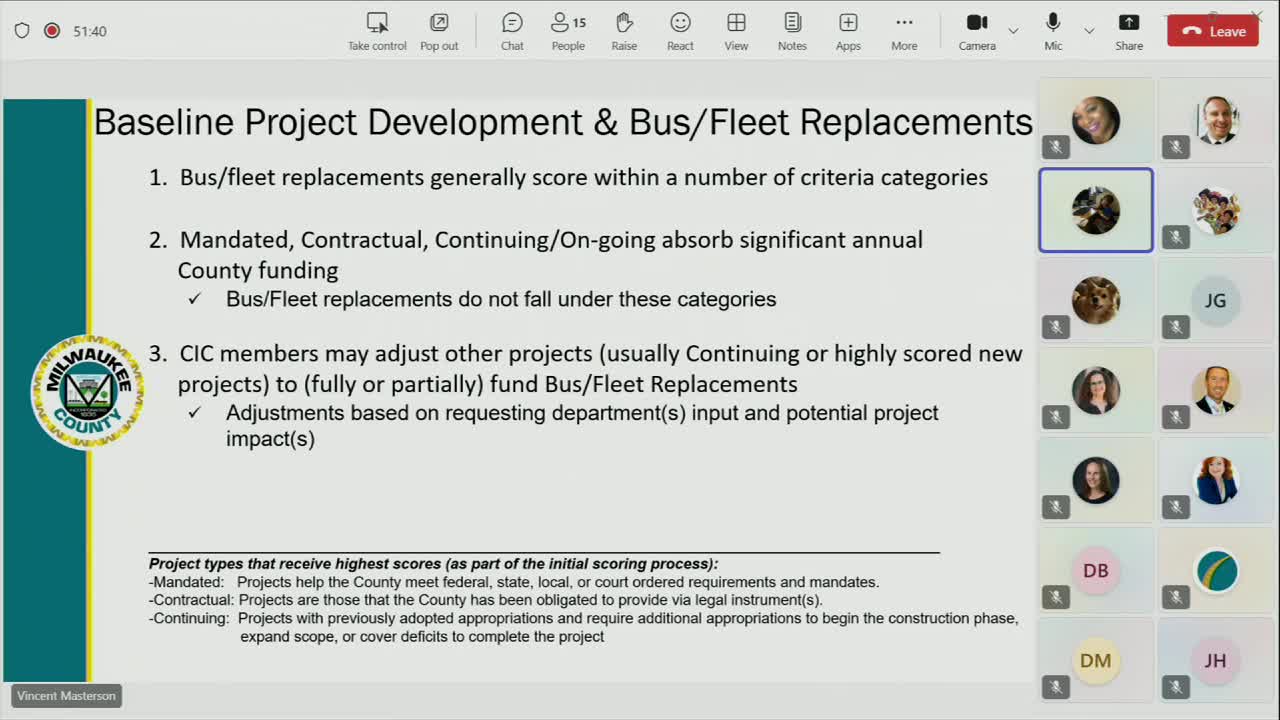County Discusses Funding Strategies for Bus and Fleet Replacement Projects
July 23, 2025 | Milwaukee County, Wisconsin
This article was created by AI summarizing key points discussed. AI makes mistakes, so for full details and context, please refer to the video of the full meeting. Please report any errors so we can fix them. Report an error »

During a recent Milwaukee County Capital Improvements Committee meeting, significant discussions centered on the challenges of managing the county's capital projects, particularly in relation to bus and fleet replacements. The committee highlighted that accommodating these essential replacements often leads to delays or reductions in funding for other highly rated projects.
As of January 2025, Milwaukee County is overseeing approximately 285 active projects, excluding those funded by the American Rescue Plan Act (ARPA) or airport initiatives. Among these, 27 projects are currently in design or construction phases, requiring an estimated $70 million in funding over the next few years. However, the county is grappling with bonding constraints, having already committed to major capital projects that exceed its normal bonding cap. Notable commitments include $45 million for a new public museum and nearly $63 million for a new forensic science center.
The committee also discussed potential future financial pressures, including a proposed $474 million courthouse complex and an additional $30 million for the Mitchell Park Domes. If bus and fleet projects were to be excluded from the bonding cap, it could lead to an additional annual funding need of $16 to $22 million, significantly increasing the county's debt service obligations.
To address these challenges, the committee proposed two options for managing bus and fleet capital requests. The first option suggests establishing a dedicated funding carve-out for critical bus and fleet replacements, treating them similarly to mandated projects. This would ensure that essential replacements are prioritized before other projects are evaluated. The second option would maintain the current approach, where bus and fleet replacements are assessed alongside other capital projects without guaranteed funding.
The committee's recommendations aim to balance the need for essential transportation services with the financial realities of managing a growing list of capital projects. As these discussions unfold, the outcomes will directly impact the county's ability to maintain and improve public services for its residents.
As of January 2025, Milwaukee County is overseeing approximately 285 active projects, excluding those funded by the American Rescue Plan Act (ARPA) or airport initiatives. Among these, 27 projects are currently in design or construction phases, requiring an estimated $70 million in funding over the next few years. However, the county is grappling with bonding constraints, having already committed to major capital projects that exceed its normal bonding cap. Notable commitments include $45 million for a new public museum and nearly $63 million for a new forensic science center.
The committee also discussed potential future financial pressures, including a proposed $474 million courthouse complex and an additional $30 million for the Mitchell Park Domes. If bus and fleet projects were to be excluded from the bonding cap, it could lead to an additional annual funding need of $16 to $22 million, significantly increasing the county's debt service obligations.
To address these challenges, the committee proposed two options for managing bus and fleet capital requests. The first option suggests establishing a dedicated funding carve-out for critical bus and fleet replacements, treating them similarly to mandated projects. This would ensure that essential replacements are prioritized before other projects are evaluated. The second option would maintain the current approach, where bus and fleet replacements are assessed alongside other capital projects without guaranteed funding.
The committee's recommendations aim to balance the need for essential transportation services with the financial realities of managing a growing list of capital projects. As these discussions unfold, the outcomes will directly impact the county's ability to maintain and improve public services for its residents.
View full meeting
This article is based on a recent meeting—watch the full video and explore the complete transcript for deeper insights into the discussion.
View full meeting
